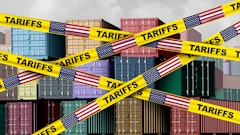
The dust may be slowly settling around the United Kingdom’s (U.K.’s) decision to leave the European Union (EU), but the uncertainty of the potential changes and impacts on business relationships remain top of mind. Thousands of laws and contracts will need to be rewritten, leaving companies wondering what the future looks like when it comes to acquiring goods and services.
Brexit will prompt changes in currency and exchange rates, governing law, logistics and trade rules, making it critical for procurement officers to look ahead at the possible effects on purchasing in and out of the U.K.
Currency Cutbacks
With the referendum vote in the U.K., the pound value drastically dropped, falling from $1.48 to below $1.30—putting businesses and importers in a bind as they increase inflation forecasts. The Bank of England even cut interest rates for the first time in seven years in an attempt to prevent a possible post-Brexit recession. As currency fluctuations cause the cost of many imports to rise, businesses may need to re-examine and renegotiate their contracts.
How does this affect procurement professionals? Beyond simply controlling expenses, procurement officials may be expected to manage legal and regulatory exposure, while also providing valuable intelligence to key stakeholders. With wild swings in currency markets, business performance is uncertain and procurement officers should be wary of invoicing provisions tied to the euro or the pound, or involving global delivery from different countries. If these currency changes diminish the value or profit margin for businesses to produce a product, they may look to invoke force majeure or termination provisions—putting all goods and services necessary to keep a business moving forward at risk.
Movement Moderations
Brexit could also alter the movement of goods and services in and out of the U.K. through delays and possible inspections at border crossings. The ebb and flow of delivery is critical for an organization’s production and product delivery, and many contracts may be violated. In addition to products, people-heavy business relationships could be restricted in terms of labor or delivery, ultimately impacting the underlying economics of contracts. For example, a party’s ability to staff certain locations, due to visa applications and importing/exporting tariffs, could be limited.
Furthermore, agreements based on the assumption of free labor could affect delivery expectations for time, cost and quality. Previous provisions or rights for the EU are no longer applicable to the U.K., requiring procurement officers to issue revised or completely new contracts to cover the U.K.
Procurement Preparedness
As with anything, the future is uncertain. However, procurement professionals have the opportunity to prepare for the possible ramifications of Brexit—starting with a clear understanding of what elements are defined inside contracts.
By taking currency and trade logistics into consideration, procurement professionals can anticipate potential changes, and better provide the analytics and guidance necessary to make better business decisions. Instead of solely exploring cost reduction, procurement officers should look at the bigger picture for an organization to lower their overall costs through increasing savings on purchasing, monitoring risk exposure and enhancing supplier visibility.


















